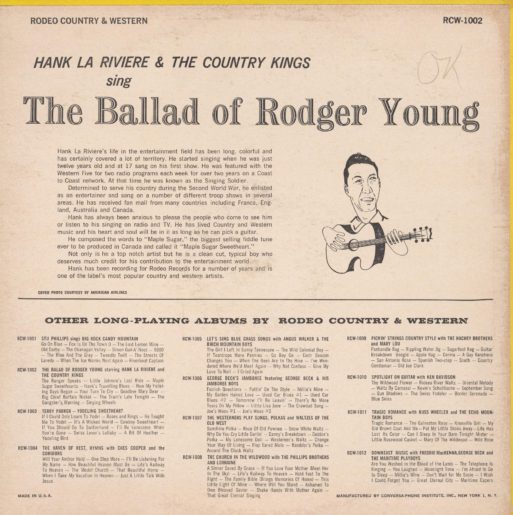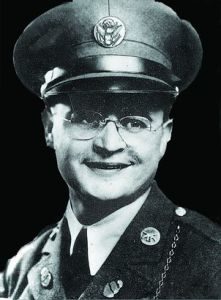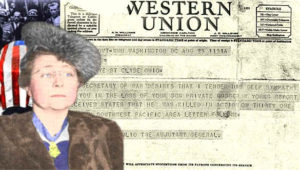 “The Ballad of Rodger Young” was released as a single in 1945. It tells the story of a brave young infantryman who charged a Japanese gun nest, drawing fire so that his comrades could escape.
“The Ballad of Rodger Young” was released as a single in 1945. It tells the story of a brave young infantryman who charged a Japanese gun nest, drawing fire so that his comrades could escape.

Credit: buckeyesmuse.com
Although the Army usually does not overwhelm its service members with praise, “The Ballad of Rodger Young” makes an exception:
“Oh they’ve got no time for glory in the Infantry.
Oh they’ve got no use for praises loudly sung,
But in every soldier’s heart in all the Infantry
Shines the name, shines the name of Rodger Young.
Shines the name – Rodger Young
Fought and died for the men he marched among.
To the everlasting glory of the Infantry
Lives the story of Private Rodger Young.”
“The Ballad of Rodger Young” was written by Frank Loesser who worked in the Army radio production unit. He wrote patriotic songs to boost morale and enhance recruitment efforts. One day he was scanning the list of Medal of Honor recipients and came across Rodger Young’s story.
It contained all the elements of a good story – the fearless hero, the saving of many lives and a valiant death. Furthermore, the name Rodger Young was an ethnically neutral name that most people would relate to.
When the song was released, few people paid much attention to it. Then Burl Ives performed “The Ballad of Rodger Young” on the “B” side of one of his singles and “The Ballad of Rodger Young” began to generate a spark of interest.
“Caught in ambush lay a company of rifleman –
Just grenades against machine guns in the gloom –
Caught in ambush till this one of 20 riflemen
Volunteered, volunteered to meet his doom.”
There are two theories about Rodger Young’s death. The first is that, being almost deaf, he did not hear his commander’s call to retreat. Young had suffered severe hearing loss after a head injury in high school. In fact, if he had been drafted, he would have been considered medically unfit for service. He got into the service by joining the National Guard, which had somewhat looser standards.
When Young was promoted, he went to his commander and asked to be returned to the rank of private. He could not hear the commands shouted on the battlefield and he didn’t want to be responsible for the welfare of men in combat. Amidst the constant barrage of machine gun fire, the cries of wounded and dying men and shouted orders, it is quite possible that Young didn’t hear the critical command and kept pushing forward. This version is the story the Army endorsed in the posthumously awarded Medal of Honor.

The cable informing Young’s family of his death
Credit: homeoftheheroes.com
Another version is that Young knew his unit was ordered to pull back but charged the machine gun nest anyway. He might have realized that his friends would be shot in the back if they fled. The machine gun had to be destroyed if any of his comrades were to survive:
“It was he who drew the fire of the enemy
That a company of men might live to fight
And before the deadly fire of the enemy
Stood the man, stood the man we hail tonight.”
Death is a sad but inevitable part of war. Songs commemorating fallen heroes like “The Ballad of Rodger Young” can help a nation unite in its grief and move forward as a cohesive unit.

 “The Ballad of Rodger Young” Shares the Story of a Fallen Hero
“The Ballad of Rodger Young” Shares the Story of a Fallen Hero


 Final Messages of the Dying
Final Messages of the Dying
 Will I Die in Pain?
Will I Die in Pain?















